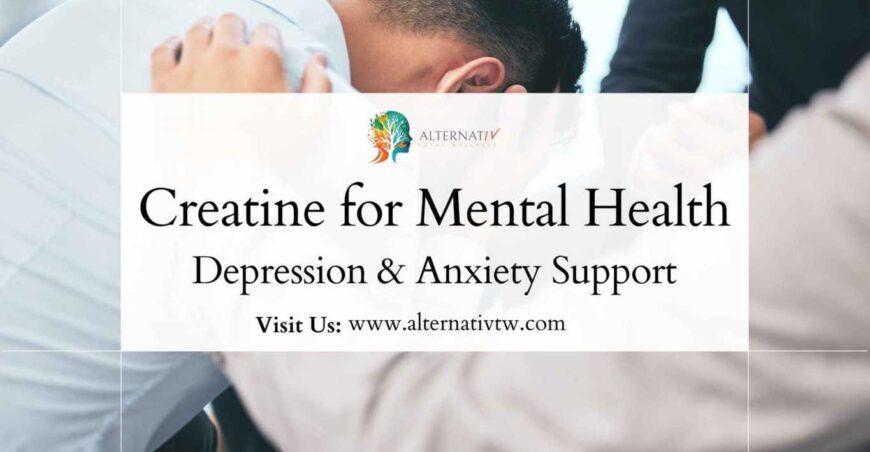Introduction
Mental health disorders, particularly depression and anxiety, are some of the most prevalent conditions affecting individuals today. Despite the availability of conventional treatments like medication and therapy, there is increasing interest in alternative options like creatine supplementation, traditionally used to boost athletic performance and improve mental health outcomes.
Recent research has suggested that creatine supplementation may offer benefits for mental health, particularly in alleviating symptoms of depression and anxiety. This emerging interest is driven by the discovery that creatine plays a critical role in brain energy metabolism, which can directly impact mood and cognitive function.
What is Creatine and How is it Stored?
Creatine is a naturally occurring compound found mainly in muscles and the brain, produced by the body and obtained through dietary sources like meat and fish. While it’s widely known for enhancing athletic performance by boosting energy availability in muscles, recent research highlights its potential benefits for mental health, particularly in regulating mood and reducing symptoms of depression and anxiety.
Creatine Storage in the Brain
- 95% of creatine is stored in skeletal muscle, while the remaining 5% is in the brain and other tissues.
- In the brain, creatine phosphate helps maintain energy homeostasis, ensuring neurons have enough energy to:
- Communicate effectively
- Process information
- Regulate emotions
- Creatine helps regenerate adenosine triphosphate (ATP), the brain’s primary energy molecule, supporting cognitive function and emotional stability, especially during periods of high stress.
The Role of Creatine in Energy Production
Creatine’s main job in the body is to keep energy levels up, especially when the body or brain is under stress.
How Creatine Supports Brain Energy
- When cells are under physical or mental stress, ATP (energy) depletes quickly.
- Creatine phosphate restores ATP, ensuring a steady energy supply for the brain.
- This process, called the phosphocreatine system, helps brain cells perform key functions like:
- Sending signals between neurons
- Managing brain activity
- Regulating emotions and cognition
Since low brain energy levels are linked to depression and anxiety, creatine’s ability to stabilize energy may help reduce mental fatigue and mood disturbances.
Creatine and Brain Function: The Biology
Why Brain Energy Matters for Mental Health
Mental health conditions like depression and anxiety are increasingly being linked to energy deficiencies in the brain. Bioenergetics, the process of generating and using energy at the cellular level, is crucial for:
- Neurotransmitter production
- Maintaining brain function
- Regulating mood and emotions
ATP and Brain Health
- Low ATP levels in the brain may lead to:
- Fatigue and brain fog
- Lack of motivation
- Emotional instability
- Creatine supplementation may restore ATP levels, improving neural function and emotional stability.
By enhancing energy metabolism, creatine helps reduce stress-related symptoms and supports overall brain health.
Creatine’s Potential to Alleviate Depression and Anxiety Symptoms
Creatine and Depression
Depression is a complex disorder with multiple contributing factors. Research suggests that brain energy deficits play a major role in depressive symptoms.
- A study in Frontiers in Psychiatry found that creatine combined with antidepressants improved symptoms in individuals with treatment-resistant depression.
- Patients using both creatine and antidepressants had a 40% higher chance of remission than those using antidepressants alone.
Animal studies also suggest that creatine supplementation restores ATP levels and reduces stress-induced depressive behaviors.
Creatine and Anxiety
Anxiety disorders often involve high stress levels, which increase brain energy demands. Over time, this chronic stress can deplete ATP stores, worsening symptoms.
How Creatine Helps with Anxiety
- Supports brain energy balance, reducing cognitive fatigue
- Enhances neural resilience, helping the brain manage stress better
- Improves neurotransmitter function, potentially reducing overactive stress responses
Animal research suggests that creatine supplementation can reduce anxiety-like behaviors, likely by restoring ATP levels in key brain regions.
How Does Creatine Work with Existing Treatments?
While creatine shows promise, it is not a replacement for traditional treatments like SSRIs, ketamine, or psychotherapy. Instead, it may serve as an adjunct therapy, enhancing the effects of existing treatments.
Creatine and Antidepressants
A clinical study found that adding creatine to SSRIs improved symptoms more quickly than SSRIs alone. This suggests that creatine enhances brain energy metabolism, leading to faster relief from depression symptoms.
Creatine and Ketamine Therapy
Ketamine provides rapid relief for treatment-resistant depression, but its effects fade over time.
- Creatine may help prolong ketamine’s benefits by stabilizing brain energy metabolism, reducing the need for frequent booster sessions.
Recommended Dosages and Safety
How Much Creatine Should You Take?
Recommended Dosage for Mental Health:
- 3 to 5 grams per day is typically sufficient for brain function and mood regulation.
- If no improvements are seen in 2-3 weeks, the dose can be increased to 10 grams daily for a short period.
Since most creatine is stored in muscles, a higher dose may be needed to ensure enough reaches the brain.
Is Creatine Safe?
Creatine has a strong safety profile and is widely studied. Common concerns like kidney damage have been debunked by research.
Potential side effects: Some individuals may experience mild bloating, water retention, or digestive discomfort, but these effects are usually temporary.
Important: Always consult a healthcare provider before adding creatine supplementation, especially if you’re taking mental health medications.
Conclusion: Should You Try Creatine for Mental Health?
Creatine is a natural, affordable, and safe supplement that may support mental health by enhancing brain energy metabolism. It could be especially beneficial for individuals struggling with:
- Depression and lack of motivation
- Chronic anxiety and stress
- Brain fog and cognitive fatigue
While not a standalone treatment, creatine can be a valuable addition to antidepressants, psychotherapy, or ketamine therapy.

